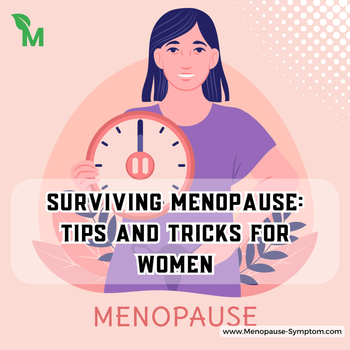Perimenopause is also known as the menopausal transition. This period usually occurs between the ages of 45-50, and it can last 3-5 years depending on the person.
Changes in the body during perimenopause and menopause can include:
1. Irregular periods
Hormonal changes affect the ovaries' production of eggs, and this can cause irregular periods (early or late), lighter or heavier menstrual bleeding. This symptom usually occurs after the age of 40.
2. Hot flashes
Hot flashes and sweating are the most common signs of perimenopause, often accompanied by snoring and difficulty sleeping, causing fatigue. This hot flash can last for about 30 minutes. When estrogen levels decrease, blood vessels can dilate rapidly and increase skin temperature. This phenomenon can cause a hot feeling that spreads from the chest to the shoulders, neck and head.
3. Osteoporosis
Estrogen is an important hormone to maintain bone health, helping to increase the absorption rate of calcium. During perimenopause, ovarian function gradually declines, causing estrogen in the body to decrease, causing a large amount of bone weight loss, thereby affecting bone strength.
During this period, taking care of physical and mental health is very important for women. Especially muscle health and bone density become more important than ever. Because building strong muscles and bones takes a long time, if not taken care of early, after this period, the body will have difficulty absorbing nutrients and rebuilding muscles and bones. One of the effective methods to improve physical health is resistance training.
Resistance Training: What and Why?
Resistance training involves using weights, resistance bands, or your own body to build strength. Not only does it help increase muscle strength, it also increases bone density, which is important for women going through menopause.
Benefits of Resistance Training During Menopause
Improves Muscle Strength: One of the biggest benefits of resistance training is its ability to increase muscle strength. As we enter menopause, our muscles tend to weaken due to the decrease in estrogen. Regular exercise helps prevent this loss and keeps our muscles strong.
Increases Bone Density: Resistance training helps stimulate the bones to produce new bone cells, thereby increasing bone density. As bone density improves, women can reduce their risk of fractures as they enter menopause.
Improve Flexibility: Resistance training not only helps develop strength but also improves the body's flexibility. This flexibility helps reduce the risk of injury when performing daily activities.
Improve Sleep Quality: Another benefit of resistance training is improved sleep quality. Women in perimenopause often experience insomnia. Exercise can help regulate your circadian rhythm and promote deeper sleep.
More Optimistic Mentality: Exercise in general and resistance training in particular play a positive role in mental health. The endorphins released during exercise can help improve mood, reduce anxiety and depression - symptoms that can occur during menopause.
Suitable Resistance Exercises
To achieve the above benefits, women in perimenopause should apply suitable resistance exercises such as:
Leg Curls: This exercise helps strengthen the muscles in the thighs and buttocks. You can use your body weight or dumbbells to increase the effectiveness.
Deadlift: This is a great exercise for the back, legs and abs. Deadlift helps improve overall strength and increase bone density.
Squats: Working the largest muscle group in the body, squats not only help with strength but also improve knee health.
Do Light Weight Exercises: Use light weights to do movements like push-ups and pull-ups. These movements can help build strength without overloading the body.
Tips for Starting Resistance Training
Start Slowly: If you have never done resistance training before or have not done it in a long time, start slowly to avoid injury. You can do the simplest exercises such as push-ups, sit-ups, squats and start with the simplest positions.
Starting with simple movements will help you avoid injuries when exercising. Moreover, simple exercises will help your body gradually get used to the pace and volume. If you train too hard or get too tired in the first few sessions, you will tend to rest longer and stop exercising completely.
Workout According to a Program: You should set up a regular exercise program and try to stick to it. For example, you can start with 2-3 sessions per week, 1-2 hours per session. The first few workouts don't need to be too strenuous, start slowly as long as you have some activity to help your body adapt.
Get a Trainer: If possible, find a trainer to guide you through each exercise. A trainer can also help you manage your workout time and having someone to accompany you will help you stay motivated.
Listen to your body: Always listen to your body. If you feel pain or discomfort, stop and find out why. Remember that you are exercising to improve your health, avoid injury as much as possible.
Conclusion
Perimenopause and menopause are challenging times for women's health. Therefore, applying resistance training appropriately can help increase muscle strength and bone density, thereby helping women live healthier and more energetic during this period. Be patient and love yourself as you go through this phase, because health is the beginning of a life full of joy and meaning!
Source: Team MPS compiled, analyzed and wrote. Please dont reup without source. Many thanks.

Surviving Menopause: Tips And Tricks For Women
10.07.2024
Learn how to conquer the challenges of menopause and navigate this stage of life with grace and ease, using helpful tips and practical advice.

Managing Perimenopause: Tips For A Smooth Transition
10.07.2024

Perimenopause: Exercise Tips For A Healthier You
10.08.2024
Perimenopause is a natural transition in every woman's life, it is the time when the body begins the natural transition to menopause, marking the end of a woman's reproductive years.
